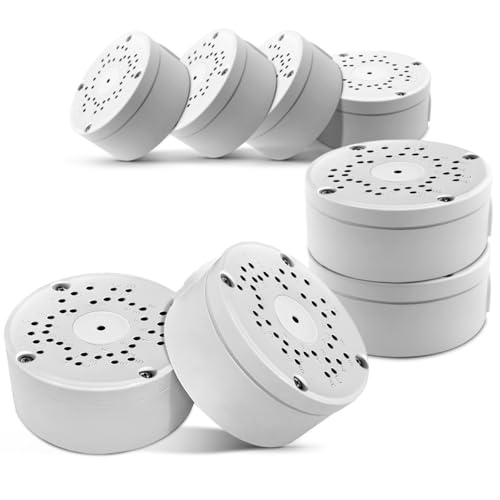
Outdoor security cameras are an essential part of a home security system, helping to protect your property and loved ones. But where exactly should you install them to maximize their effectiveness? Choosing the right locations for your outdoor security cameras is crucial for ensuring optimal coverage and surveillance.
One key consideration when deciding where to install outdoor security cameras is to identify vulnerable areas around your property. These could include entry points such as doors, windows, and gates, as well as blind spots where intruders could easily hide. Placing cameras in these strategic locations can help deter potential burglars and provide valuable evidence in case of a security breach.
Another important factor to consider is camera placement and angle. Outdoor security cameras should be positioned at a height that allows for a clear view of the area being monitored, while also ensuring they are out of reach of potential tampering. It’s also crucial to angle the cameras correctly to capture important details such as faces and license plates.
Factors to Consider
When deciding where to install outdoor security cameras, there are several factors to consider to ensure optimal coverage and effectiveness.
1. Vulnerable Entry Points
Identify the vulnerable areas around your property such as doors, windows, and gates where intruders are likely to enter. Install cameras strategically to cover these entry points.
2. Line of Sight
Ensure that the cameras have a clear line of sight to capture important details. Avoid obstructions like trees, bushes, or walls that may block the view.
Consider the lighting conditions in the area and choose cameras with night vision capabilities for round-the-clock surveillance.
Best Locations for Outdoor Security Cameras
When installing outdoor security cameras, it is important to choose the right locations to ensure maximum coverage and effectiveness. Here are some of the best locations to consider:
| 1. Front Door: | Placing a camera near the front door is essential as it allows you to see who is coming and going from your home. |
| 2. Backyard: | Positioning a camera in the backyard can help you monitor any activity in your outdoor space and deter potential intruders. |
| 3. Garage: | Installing a camera in the garage can protect your vehicles and belongings stored inside. |
| 4. Side Gates: | Placing cameras near side gates can help secure access points to your property and prevent unauthorized entry. |
| 5. Windows: | Mounting cameras near windows can provide additional security and capture any suspicious activity outside your home. |
By strategically placing outdoor security cameras in these locations, you can enhance the safety and security of your property.
Important Features to Look for
When choosing outdoor security cameras, there are several important features to consider:
1. Weatherproofing: Look for cameras that are specifically designed for outdoor use and can withstand various weather conditions.
2. Night vision: Ensure the cameras have infrared technology for clear footage even in low light or complete darkness.
3. Motion detection: Opt for cameras with motion sensors that can detect movement and send alerts to your phone or email.
4. Resolution: Higher resolution cameras will provide clearer images and better quality footage.
5. Remote access: Choose cameras that allow you to monitor your property from anywhere using a smartphone or computer.
6. Storage: Consider cameras with built-in storage or options for cloud storage to save and access recordings.
7. Power source: Decide whether you want cameras that are battery-powered, wired, or solar-powered based on your needs and preferences.
Installation Tips
When installing outdoor security cameras, consider the following tips to ensure optimal performance and coverage:
- Choose strategic locations: Install cameras at entry points, near windows, and in areas with high foot traffic for maximum coverage.
- Mount cameras at the right height: Position cameras at eye level to capture clear images of faces and activities.
- Protect cameras from the elements: Use weatherproof housing and mounts to shield cameras from rain, snow, and extreme temperatures.
- Ensure proper lighting: Install cameras in well-lit areas or use cameras with built-in night vision for clear footage day and night.
- Secure wiring: Conceal cables and wires to prevent tampering and ensure a clean installation.
- Regular maintenance: Clean lenses and check camera angles periodically to maintain optimal performance.
Wiring and Connectivity
When installing outdoor security cameras, it is crucial to consider the wiring and connectivity options. Here are some key points to keep in mind:
1. Power Source:
Make sure your outdoor security cameras have a reliable power source. You can choose between wired cameras that need to be connected to a power outlet or battery-powered cameras that offer more flexibility in terms of installation.
2. Connectivity:
Ensure that your cameras are connected to a stable network for remote monitoring. You can opt for wired Ethernet connections or wireless options like Wi-Fi or cellular connectivity. Consider the range and signal strength of your chosen connectivity method to ensure seamless operation.
Weatherproofing and Durability
When installing outdoor security cameras, it is crucial to consider the weather conditions in your area. Look for cameras that are specifically designed to be weatherproof and can withstand extreme temperatures, rain, snow, and other elements. Make sure the cameras have an IP rating of at least IP65 or higher to ensure they are protected against dust and water ingress.
Additionally, choose cameras made of durable materials such as metal or high-quality plastic that can withstand outdoor conditions for an extended period. Investing in weatherproof and durable cameras will ensure that your security system remains operational and reliable even in harsh weather conditions.
Legal Considerations
When installing outdoor security cameras, it is important to consider the legal implications. Before placing cameras on your property, be sure to familiarize yourself with local laws and regulations regarding surveillance cameras. Some areas may have restrictions on where cameras can be placed or how they can be used.
Additionally, it is crucial to respect the privacy of others when installing security cameras. Avoid pointing cameras at areas where individuals have a reasonable expectation of privacy, such as windows or private property. Be transparent about the presence of cameras by posting signs to notify visitors that they are being recorded.







